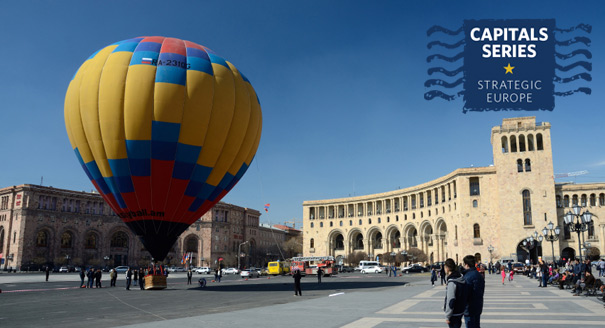
As a contributor to the Carnegie Europe’s series of analytical articles in Judy Dempsey’s Strategic Europe, Regional Studies center (RSC) Analyst Dr. Mikayel Zolyan authored a “Letter from Yerevan,” offering his innovative assessment of the view of EU foreign policy from Armenia.
.Dr. Zolyan noted that with “the beginning of a new round of negotiations” between Armenia and the EU , “ultimately, the EU’s current policies toward Armenia can be assessed as satisfactory, at least given the complicated geopolitical realities of today.” But he added that “any new EU-Armenian agreement is bound to be more limited in scope” than Armenia earlier draft Association Agreement, which Armenia sacrificed in 2013, “since Armenia is now a member of a different economic bloc—the Eurasian Economic Union. To make sure that EU policies toward Armenia in the future are more adequate, the causes of that failure need to be understood.”
The assessment then went on to add that “ultimately, Armenia is bound to look toward Europe if it wants to achieve the successful modernization of its economic and political systems. The extent to which such cooperation would be possible in the current conditions remains to be seen. Most probably, the partnership with Russia is bound to remain a part of the picture, at least in the short term. But Yerevan also needs to find its own voice when it comes to foreign policy and make sure that any partnership in which it is involved does not limit Armenia’s ability to make sovereign decisions based on the interests of the country.”
Concluding his analysis, Dr. Zolyan argued that overall, “the EU has pursued the optimal approach: respecting Armenia’s choice and maintaining links with Armenia as much as possible—in other words, a strategy aimed at minimizing harm.
But if one looks at the bigger picture, EU policies toward Armenia reveal some of the weaknesses of the EU’s approach to post-Soviet states. During the negotiations on the Association Agreement, the EU focused on working with the government in Yerevan but did little to educate Armenian society about the benefits of the accord. As a result, many Armenians were either ignorant of the agreement in general and its potential benefits or, worse, saw it as a threat to Armenia’s sovereignty and national identity.
Hence, it was easy for Armenia’s government to ditch the deal, and only a small group of civil society activists protested when that happened. This is a reflection of a larger issue: the EU has been unwilling or unable to match Moscow’s immense soft power in the post-Soviet space with an adequate effort of its own.
In addition, the EU should be paying more attention to the Nagorno-Karabakh conflict. The EU cannot take on the functions of the Organization for Security and Cooperation in Europe or NATO when it comes to dealing with armed conflicts. But more involvement from the EU on the levels of both diplomacy and civil society could help mitigate the danger of a full-blown escalation in Nagorno-Karabakh before it is too late.”

